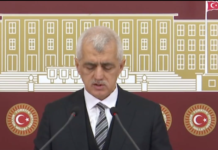Turkey’s Radio and Television Supreme Council (RTÜK), which monitors broadcasts on national television and radio stations, is also intending to scrutinize broadcasts on YouTube and other social media sites, Turkish Minute reported, citing a press statement from the council.
The move is likely to tighten the government’s grip on social media and increase online censorship in the country.
RTÜK issued its statement in the wake of broadcasts on YouTube following a football match between Galatasaray and Antalyaspor on February 26.
The council said it had examined the broadcasts on some outlets during which the clubs and the match’s referee, Abdulkadir Bitigen, were insulted and targeted.
It said the broadcast that angered the Galatasaray team and its fans was aired on YouTube, which is “beyond the scope of our authority.”
“Talks are underway with YouTube to monitor such broadcasts. … Social media sites are expected to be subject to RTÜK monitoring in the future following the passage of the necessary legislation,” RTÜK said in its statement.
In 2019 Turkey revised its media regulations to allow RTÜK to supervise online broadcasts. Since the new regulations went into effect, various streaming platforms including Netflix and Amazon Prime have applied for and received licenses. Others such as the Turkish editions of Deutche Welle and Voice of America were blocked in Turkey in July 2022 when they refused to obtain the licenses demanded by RTÜK.
The outlets described RTÜK’s order in February 2022 as an attempt at censorship and an expansion of the Turkish government’s control over domestic media to foreign outlets, which are the only source of free and independent journalism for some people in Turkey, where the majority of the media is controlled by the government.
Turkey, where internet freedom has steadily declined over the past decade, ranks among the “not free” countries concerning online freedoms, according to a report released by the US-based nonprofit Freedom House in October.















